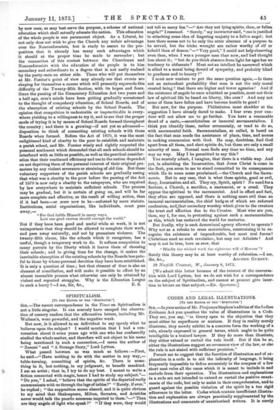SPIRITUALISM.
[TO THE EDITOR OF THE "SPECTATOR."] Sin,—The recent correspondence in the Times on Spiritualism is not a little singular. It can scarcely have escaped the observa- tion of cursory readers that the affirmative letters, including Mr. Wallace's, were powerful, and the negative weak.
But now, is it allowed to an individual to say openly what he believes upon the subject ? I would mention that I had a con- versation about it some years ago with one who has confessedly studied the whole matter, and therefore will not object to his name being mentioned in such a connection,—I mean the author of
Zanoni " and " A-Strange Story," Lord Lytton.
What passed between us was much as follows :—First, lIe said—" Have nothing to do with the matter in any way,- table-turning, consulting of spirits, &c. There is some- thing in it, but nothing, in my judgment, to benefit mankind. I am an artist ; that is, I try to do my best. I meant to write a fiction connected with magic, hence I had to study my subject."— "Do you," I asked, "believe that the spirits of the departed really communicate with us through the legs of tables ?" "Rarely, if ever," he replied ; "the supposition seems absurd, and it is quite obvious to my mind that Shakespeare, Milton, Socrates, and Aristides never would talk the puerile nonsense imputed to them."—" Then are they angels of light who speak ?" "If they were, they would not tell so many lies."—" Are they not lying spirits, then, or fallen angels?" I resumed. "Surely," my instructor said, "one is justified in attaching some idea of lingering majesty to a fallen angel; but here there seems not to be only the utter absence of a purpose to be served, but the tricks wrought are rather worthy of elf or kobold than of demon."—" Very good," I could not help observing even then, when I was a younger man than now, and had thought less about it ; " but do you think absence from light for ages has no tendency to obfuscate ? Must not an intellect be narrowed which is allied to a moral being devoid of sympathy, and probably blind to goodness and to beauty ?"
I must now venture to put the same question again,—Is there not an antecedent probability that man is not the only moral created being? that there are higher and lower agencies? And if the existence of angels be once admitted as possible, must not their law of spiritual life be based on liberty, like ours ? And may not some of them have fallen and have become hostile to good ?
But now, for the purpose. Philistinism must shudder at the suggestion I have already dared to make. I fear even your can- dour will not allow me to go farther. You have a reasonable dread of a caste,—sacerdotalism or immoral sacramentalism. I think you identify these, rather erroneously, or tend to do so, with sacramental faith. Sacramentaliam, so called, is based on the fact that man needs the assistance of place, time, and means in seeking communion with God. He may, doubtless, find God apart from all these, and elect spirits do, but these are only a small minority of men. Normal man finds any time no time, and any way no way. May I be permitted to say this?
You scarcely admit, I imagine, that there is a visible way. And yet, in admitting the Incarnation, that Jesus Christ is come in the flesh, you seem to me to stand committed to its consequences which He in some sense proclaimed,—the Church and the Sacra- ments. But in any case, that is what these spirits, good or evil, deny, Incarnation and all. They cry, Spirit, spirit? No need fora Saviour, a Church, a sacrifice, a sacrament, or a creed. They oppose the spiritual to the sacramental. And in effect and fact, they often are opposed, and -there is nothing more evil than an immoral sacramentalism, the chief badges of which are enforced confession, and;that secondary worship which gives to the creature the trust and affection due to the Creator. Most wise are you, then, say I, for one, in protesting against such a sacramentalism as this, which has enslaved the world for centuries.
But finally, why is such demoniacal agency allowed to operate ? Why not as a rebuke to crass materialism, constraining it to re- cognise the existence of imponderable, but most real forces? Christians need no such revelation, but may not Atheists ? And may it not be true, here as ever, that "Blindly the wicked work the righteous will of Heaven "?
Surely this theory may be at least worthy of ref utation.—I am,
Sir, &e., ARCHER GURNEY. 29 Norfolk Crescent, W, January 8, 1873.
[We admit this letter because of the interest of the conversa- tion with Lord Lytton, but we do not wish for a correspondence on the subject of Spiritualism, and cannot at present give inser- tion to letters on that subject.—En. Spectator.]


































 Previous page
Previous page